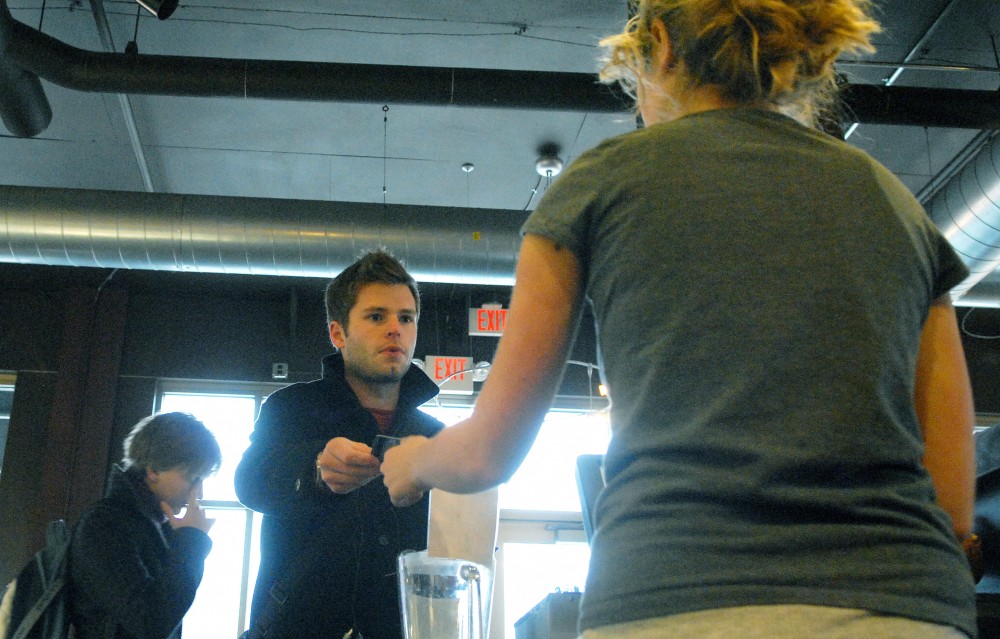Senior journalism and English studies student Caitlin Butler is well aware of the poor economy, especially the job market sheâÄôll face after her spring graduation from the University of Minnesota. But while most people are cutting back, Butler said her everyday spending habits on coffee, eating out and entertainment on the weekends hasnâÄôt changed drastically. Butler is not alone. While business profits plummeted across the country, college students have, for the most part, kept on spending. Nationwide, college students have $5 billion more at their disposal to spend on nonessentials than in 2007, bringing their combined pocketbook to $53 billion, likely funding anything from movie and electronics purchases to going out on the weekend, according to a 2008 study from Alloy Media Marketing. The study shows that the 13.6 million college students on campuses this year, ages 18 to 30, spent a record $237 billion âÄî an increase of 20 percent since 2007, the largest jump since the studyâÄôs inception in 2001. Many campus businesses have seen the positive effects of students continuing to spend. Pat Weinberg, owner of the Purple Onion Café on University Avenue Southeast, said he has been surprised at how good business has been. âÄúAll we hear in the news is how bad everything is right now,âÄù he said, âÄúso you donâÄôt expect business to be up.âÄù Although the cost of coffee drinks seems to be general knowledge among students, Weinberg said he hasnâÄôt seen a decrease in drink sales. âÄúAlmost everybody gets some kind of drink,âÄù he said. Butler, who was studying at the Purple Onion Café on Wednesday, said she probably purchases about four teas a week, but makes an effort not to spend more than $30 to $50 on eating out and entertainment expenses, like going out to bars. Christopher Shaffner, general manager of Downtime Bar & Grill in Dinkytown, said although he believes overall business in the area is down, DowntimeâÄôs books donâÄôt show much of a difference in numbers from last year to this year. âÄúWhen the economy goes south, usually a lot of the first types of things that get cut from your budget is pleasure spending,âÄù he said. Students getting financial support from parents, not having to pay a lot of bills or taking out loans, he said, all could protect students from what the average person is dealing with this economic downturn. Receiving financial support from parents is one reason Covered style adviser Bridget OâÄôBrien said she believes sales havenâÄôt been down. The Dinkytown boutique, which sells premium denim and clothing, has used the economic crisis as a way to cater to all of its shoppers, including students, OâÄôBrien said. Last weekend, the store held its version of a âÄúbailoutâÄù by offering customers $20 off a purchase of $100 or more, $40 off a purchase of $200 or more and so on. âÄúHonestly, having been a college student once myself, I would say, from my personal experience, a lot of college students arenâÄôt necessarily footing their own bill,âÄù she said. While public relations senior Cristina Reginato hasnâÄôt cut down much on entertainment expenses, she said shopping trips are one expense she has cut back on, but wouldnâÄôt credit the poor economy as the reason. Reginato said sheâÄôs in between switching part-time jobs, which has made more of a difference in her spending habits than the economy. No matter what a studentâÄôs financial situation is, they need to be aware of how much theyâÄôre spending, Catherine Solheim, associate professor of family and social science, said. Solheim, who teaches a class on personal and family finance, said people often donâÄôt know how much they spend. âÄúIf you ask people how much it takes them to live for a month, most people underestimate,âÄù she said. The students in SolheimâÄôs class have expressed concerns about finding jobs after graduation in todayâÄôs tough job market. To ease those fears, Solheim recommends students try to put away enough money to live off of for three to six months, while they look for a job. She said students should look at their time as undergraduates as a job that will come to an end, like a lay-off. âÄúIt will really hit you as a shock when you have to start paying for [living expenses],âÄù she said. Food price increases have affected Butler the most, but the senior said she and her friends are not depending on jobs right now to pay for big items like cars and houses. What seems most important to college students is saving for the short-term, like extra money for Christmas gifts or an upcoming trip, Butler said. Although saving for the future is a good idea in theory, she said most students just donâÄôt make enough money. âÄúI donâÄôt think we have a significant amount of money, so saving a little bit more might put you at a small advantage,âÄù she said, âÄúbut it wonâÄôt be the life or death of you.âÄù
Despite economic woes, student spending is steady

Image by Marija Majerle
History senior James Fox makes a purchase at The Purple Onion Café on Wednesday. Despite the current economic slump, businesses near campus have seen little change in students’ spending habits.
Published November 19, 2008
0

